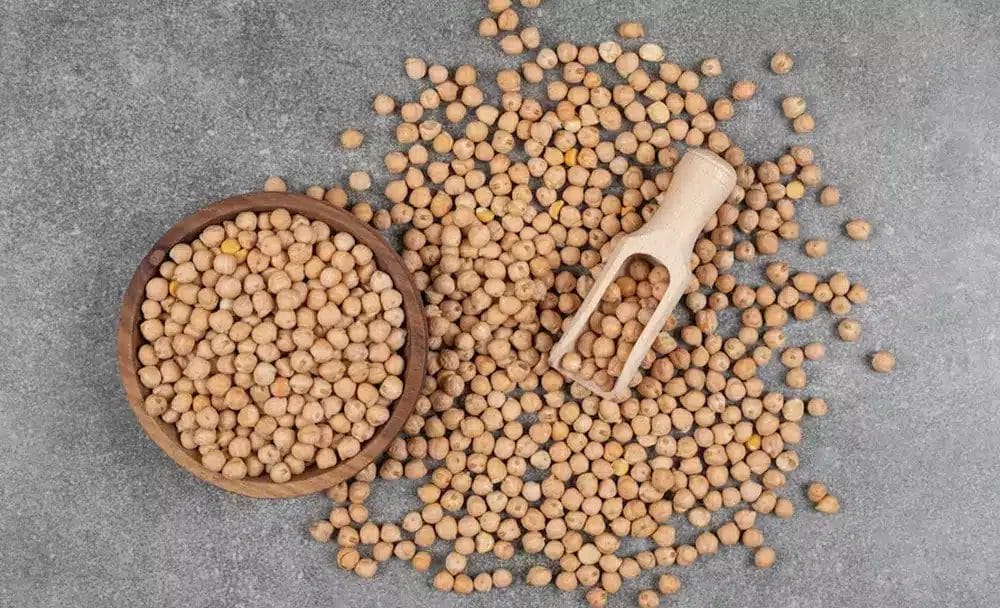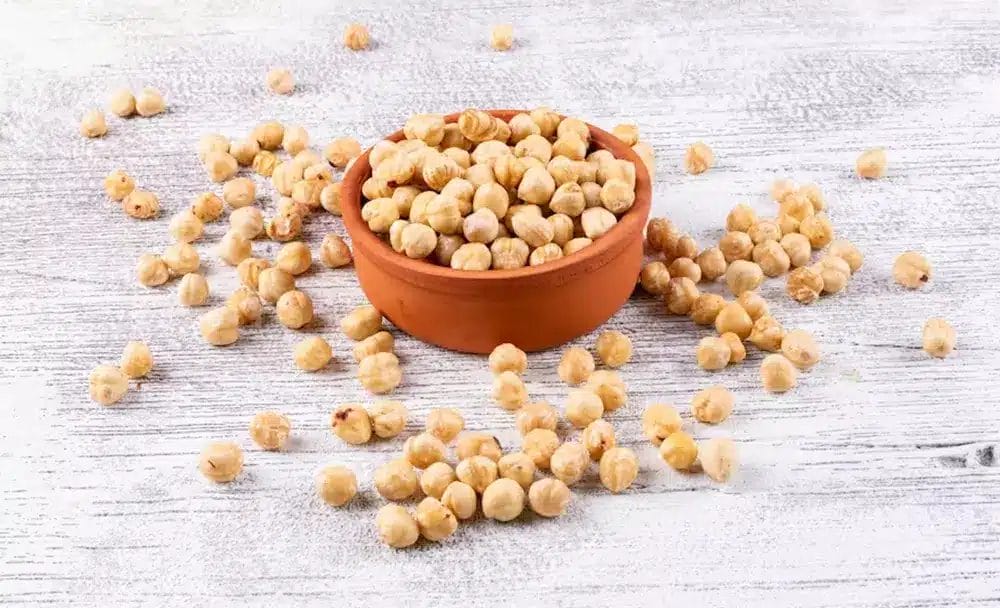
Do you eat chickpeas? Do you know they are rich in several nutrients that make them one of the best legumes for your health?
In this article, find out more about chickpeas, their health benefits and their uses in Ayurveda.
What Are Chickpeas?
Chickpeas, also known as Bengal gram or garbanzo beans, are a popular lentil in India and an important pulse crop consumed all over the world, particularly in Afro-Asian countries (1) (2).
Chickpeas are of two types, Desi and Kabuli, with Desi types accounting for about 80-85% of the total chickpea area and mostly grown in Asia and Africa, while Kabuli types are largely grown in West Asia, North Africa, North America and Europe (1).
Chickpeas Nutrition (1)
Chickpeas are cholesterol-free lentils, rich in carbohydrates and protein, with both constituents making up around 80% of the total dry seed mass. Compared to other pulses, chickpea protein is of better quality and contains significant amounts of all the essential amino acids except sulphur-containing amino acids.
As far as carbohydrates are concerned, the major carbohydrate storage in chickpeas is in the form of starch, followed by dietary fibre, oligosaccharides, and simple sugars like glucose and sucrose.
In addition to protein and carbohydrates, chickpeas are also an excellent source of unsaturated fatty acids, particularly linoleic and oleic acids, along with important sterols like β-sitosterol, campesterol, and stigmasterol.
They also contain essential minerals such as calcium, magnesium, phosphorus and potassium, and vitamins like riboflavin, niacin, thiamin, folate, and the vitamin A precursor β-carotene.
However, despite all the nutrients, chickpeas also contain anti-nutritional factors. But they can be reduced or eliminated through different cooking techniques, such as soaking, boiling, and autoclaving.
Health Benefits of Chickpeas (1)

1. Heart Diseases
Primary Benefits: Chickpeas contain phytosterols, isoflavones, and oligosaccharides that can reduce LDL-C levels in the blood, potentially lowering the risk of coronary heart disease (CHD).
Secondary Benefits: By inhibiting the intestinal absorption of cholesterol, chickpeas can help improve heart health.
2. Diabetes
Primary Benefits: Chickpeas are an excellent source of resistant starch and amylose, which are more resistant to digestion, leading to lower availability of glucose in the bloodstream.
Secondary Benefits: As such, this leads to a lower demand for insulin and a slower entry of glucose into the bloodstream, thereby reducing the risk of type 2 diabetes.
3. Hypertension
Primary Benefits: Phytosterols found in chickpeas, such as β-sitosterol, have been shown to reduce blood pressure.
Secondary Benefits: Incorporating chickpeas into your regular diet, therefore, may help reduce hypertension and lower the risk of heart disease, stroke, etc.
4. Cancer
Primary Benefits: Butyrate, a short-chain fatty acid produced from the consumption of chickpeas, has been shown to reduce the risk of colorectal cancer by suppressing cell proliferation and inducing apoptosis. Lycopene, another component found in chickpeas, is also found to reduce the risk of prostate cancer.
Secondary Benefits: As such, incorporating chickpeas into the diet can help prevent cancer as well as aid in its treatment.
5. Weight Loss or Obesity
Primary Benefits: Chickpeas are rich in dietary fibre, which helps to promote satiety and reduce hunger.
Secondary Benefits: A high-fibre diet has therefore been associated with a lower BMI and reduced risk of obesity.
6. Gut Health
Primary Benefits: Studies have shown that consuming chickpeas can lead to an overall improvement in bowel health, including increased frequency of defecation, ease of defecation, and softer stool consistency.
Secondary Benefits: As such, it can help improve gut health and treat gastrointestinal problems like constipation.
Uses of Chickpeas in Ayurveda (2)
Chickpeas have been used in Ayurvedic medicine for centuries, owing to their many beneficial properties.
According to Ayurvedic texts, chickpeas are considered light, cold, sweet, slightly astringent, and roughening and are considered beneficial for Pitta and Kapha Doshas.
Ayurveda says that the seeds of chickpeas are stimulant, tonic, aphrodisiac, and antihelminthic and are useful in bronchitis and biliousness. They are also highly effective in the treatment of leprosy and other skin diseases, dyspepsia, vomiting, indigestion, constipation, diarrhoea, and dysentery.
Boiled leaves of chickpea plants are also applied to sprains and dislocated bones, and the leaf juice is known for being stomachic and laxative. Leaves of chickpea plants are also useful in toothache and stomach disorders, and young shoots are used for ailments due to sunstroke.
Chickpeas are also considered highly beneficial for diabetes, renal stones, vomiting, worms, acidity and gastric problems, constipation, and dyspepsia in Ayurveda.
How Are Chickpeas Used in India? (1)
In the Indian subcontinent, chickpeas are usually split and ground into flour (besan) used to make a variety of snacks. Chickpeas can also be boiled or cooked in curries and stews.
The Final Takeaway
Chickpeas are an excellent source of nutrition and can provide a range of health benefits, from improved heart health to reduced risk of cancer and obesity.
Adding chickpeas to your diet can be a great way to boost your protein and fibre intake while also enjoying the many other nutrients they offer.
References
- https://www.cambridge.org/core/journals/british-journal-of-nutrition/article/nutritional-quality-and-health-benefits-of-chickpea-cicer-arietinum-l-a-review/BCD8920297E987AAABBC12BFF90EB0CF
- https://www.researchgate.net/publication/321154234_Dynamism_of_Chanaka_Cicer_aritienum_Linn_for_Human_Health_A_Review


















